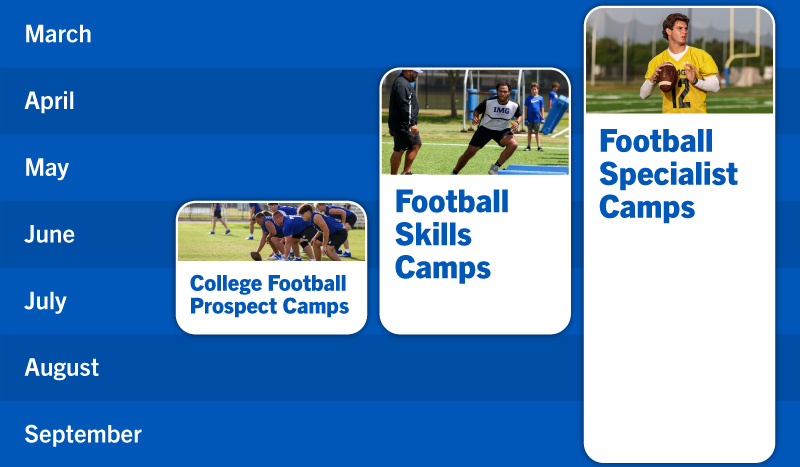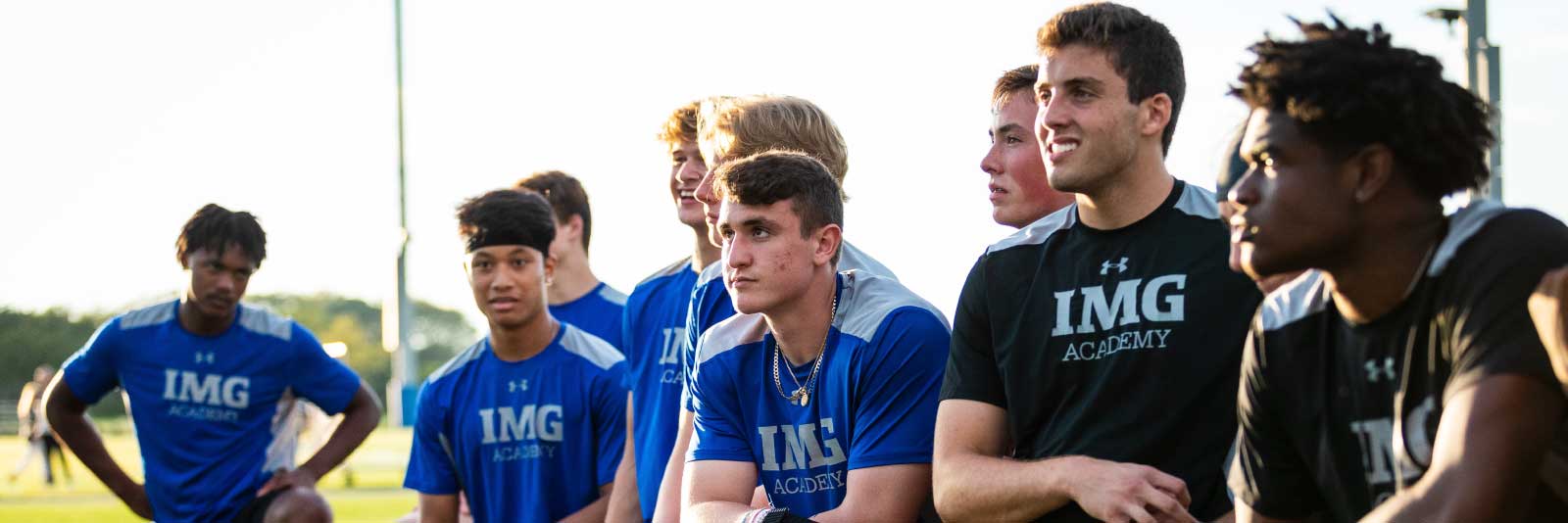Attending football camps is a great way for high school football players to learn and develop the skills they need to compete at the next level. Depending on where you’re at in the recruiting process, a football camp can help you gain exposure to college coaches and potentially earn a scholarship offer. Search our football camps finder below to find a football camp near you.
Search all football recruiting events here.
Sign up for your free NCSA Recruiting Profile today to get started on your recruiting journey.
Football Training Camps at IMG Academy
IMG Academy football camps are widely recognized as the nation’s best for a reason: they offer top-notch coaching and a proven training method that helps players reach their full potential. Open to ages 10-18, these camps provide tailored programs for all skill levels. Whether aspiring to play college football, secure a spot on the varsity team, or benefit from NFL-experienced coaches, IMG Academy’s developmental football camps cater to the needs of every young player.
different types of football camps
Camps is versatile term used in the football world. There are camps intended to develop skills and others provide exposure to college coaches. Below, we breakdown the different types of camps, what to expect and who should attend. Here are the 3 main types of camps you can attend:
Football skills camps
- Purpose: Designed to make you a better football player. Develop varsity level skills, see where you stack up against other athletes in your position and get a feel for college level workouts.
- Host: College or third party
- What to expect: Position specific drills, 1-on-1 challenges and small group instruction.
- Who should attend? Underclassman without varsity level experience or any player who wants to improve on a skillset before attending a showcase or prospect camp.
- How much does it cost? $25-$200+ per camp
Specialist football camps
- Purpose: Designed for specialty players like kickers, punters, long snappers, quarterbacks and lineman.
- Host: College or third party
- What to expect: On field workouts geared towards learning the proper technique for a unique position, classroom instruction and video sessions.
- Who should attend? Specialist players looking to improve in their position and gain footage for a skills video.
- How much does it cost? $50-$300+ per camp
College football prospect camps
- Purpose: Designed for college coaches to evaluate recruits on campus.
- Host: Colleges
- What to expect: One-day evaluations with position specific drills, combine style testing, 1-on-1 challenges and 7-on-7 competition.
- Who should attend? Upperclassmen who are actively being recruited by the college host.
- How much does it cost? $50-$100 per camp
Learn more about the other types of football events:
When do college football camps start?
Exposure-style camps take place during the NCAA evaluation period.
Skill development or position-specific camps can be found in just about every season.
Attend a football skills camp before a college exposure camp to improve your skills and increase your chances of standing out.

Will football camps help you get a scholarship offer?
Yes. Coaches want to see their top recruits perform in person. In fact, most college coaches will not even offer a football scholarship until they’ve seen them at a camp.
At camps, most college football coaches almost exclusively focus on rising seniors. D1 FBS programs split their time between rising seniors, juniors and sophomores.

The remaining division levels typically wait to make offers until the summer before senior year.
As you continue to develop and get stronger, attend football combines to refresh your recruiting profile.
What are the best football camps to get recruited or attend?
The following are some of the best position-specific sessions to skills competitions you’ll find when you search for “football camps near me.”
- IMG Academy Football Camps: Train like the top football players in the country. IMG Academy is the largest and learn directly from the same coaches who develop NFL draft selections and top D1 commits.
- Rivals Combine and Camp Series: The nation’s largest free high school football combine and camp series. Participants must earn a nomination or selection as a top performer at a Rivals Combine Series to qualify for the Rivals Camp Series.
- Nike camps: Nike is partnered with US Sports Camps, an established leader in athletic development training. Together, they offer dozens of camps in 12 states for players ages 8-18.
- Under Armour camps: UA’s season for high school football camps, which runs February through April in various cities, often attracts significant media coverage. Top camp participants earn the right to play in the UA All-America Game.
What are the best football camps for specialists?
Specialist players like kickers, punters and long snappers must learn and practice a unique set of skills that aren’t always offered at regular camps. If the camp description or itinerary doesn’t mention specialist drills, it will be a waste of your time and money.
Quarterbacks, running backs and wide receivers can also benefit from attending camps that are geared towards their position and offer high quality training. The experience of the coach or instructor at a specialist camp will be most important.
Here are some of the top specialist camps to attend for training and recruiting exposure:
- Chris Sailer Kicking Camp
- Rubio Long Snapping Camp
- QB Country Quarterback Camps
- Sports International Football Lineman Camps
- Sports International Football Passing, Receiving, DB Camp
How do you get invited to college football camps?
Highly ranked football players can sit back and wait for coaches to contact them, but the majority need to be proactive to score a personal invite to a football camp. Research programs to know where you best fit as a player and student. Once you have your list of top schools, contact the coach. Include your combine numbers, highlight film and ask for an evaluation. If they’re interested in seeing you perform in person, they may extend an invite to an upcoming camp.
How long is a D1 football camp?
Football prospect camps hosted on a D1 campus typically last 3-4 hours. If the camp is an overnight camp, you can expect each day to include 3-4 hours of drills and gameplay.
Can JUCO football players go to camps?
Athletes looking to get recruited by a junior college can attend a Junior College Evaluation Football Camp. These camps gives prospective athletes the opportunity to gain exposure, get video footage for their highlight video and train during the offseason.
Maximize Every Football Camp Opportunity
Football camps offer you the opportunity to develop your skillset, gain exposure and explore college campuses. What camps to attend and when are based on your individual recruiting goals. Whether you’re looking for the best events to attend or need recruiting advice, we’ve got you covered. And did you know an NCSA Recruiting profile helps you receive and respond to college camp invites?
Ready to get recruited? Create your free NCSA Recruiting Profile now so coaches can find you and so you can start receiving and responding to camp invites.

